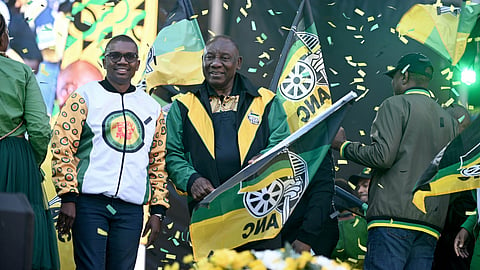News
John Matisonn on ANC’s ‘compromise’ reshuffle: A half-baked fix for a party in freefall
The ANC kicks for touch again
Key topics:
- ANC reshuffles leaders but keeps them in government roles.
- Internal tensions remain as factions prepare for 2027 leadership race.
- Voter concerns ignored, risking further decline in party support.
Sign up for your early morning brew of the BizNews Insider to keep you up to speed with the content that matters. The newsletter will land in your inbox at 5:30am weekdays. Register here.
Support South Africa's bastion of independent journalism, offering balanced insights on investments, business, and the political economy, by joining BizNews Premium. Register here.
If you prefer WhatsApp for updates, sign up to the BizNews channel here.
By John Matisonn
The ANC kicks for touch again
___STEADY_PAYWALL___

